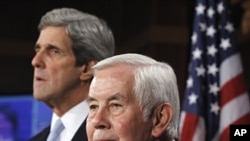The Obama administration is facing intense questioning from U.S. lawmakers about current and future U.S. efforts to reshape Libya. Nearly two months into an international military campaign, legislators are seeking answers about goals, methods, costs, and potential outcomes in the oil-rich country, where leader Moammar Gadhafi continues to cling to power.
The top Republican on the Senate Foreign Relations Committee, Richard Lugar of Indiana, expressed strong misgivings about President Barack Obama’s failure to seek congressional consent to launch war operations over Libya.
“The president should have come to Congress seeking authority to wage war in Libya. And I believe that Congress and the American people would still benefit from a debate on this matter,” he said.
Absent such a debate, Lugar had a long list of questions about U.S. involvement in Libya.
“Can other NATO nations fulfill the primary combat mission in Libya over an indefinite period? And how would the [Obama] administration respond if allies request greater military involvement by the United States? What are the administration’s plans for aiding the Libyan opposition economically and militarily, and do we have confidence in the people to whom we are providing this assistance? And how much is the administration prepared to spend over time? What responsibility will the United States assume for reconstruction of Libya?,” he asked.
Sitting alone to face the questioning was Deputy Secretary of State James Steinberg, who said NATO’s commitment to the Libyan campaign remains strong. He said the Obama administration has consulted regularly with Congress on U.S. expenditures in Libya, including up to $25 million in non-lethal assistance to the country’s Transitional National Council, which is serving as something of a shadow government while Colonel Gadhafi remains in power.
Progress
Steinberg stressed that real progress is being made. “The clear message to Gadhafi and those around him is that there is no going back to the way things were. Through the U.N. Security Council they now face a no-fly zone, an arms embargo, assets freezes and travel bans. Libya’s national oil corporation and central bank are black-listed. There is a complete consensus in the international community that there is no future that involves Gadhafi in power or as part of the solution,” he said.
Steinberg also responded to questions about the logic of tying down U.S. and NATO military resources for Libya, a single, sparsely populated country, at a time of great potential peril on the broader world stage. The deputy secretary said what happens in Libya has grave implications for the Middle East as a whole, and “fully justifies” America’s role in the international coalition.
“Gadhafi’s efforts to repress and attack his own people could have enormous consequences for the transitions in Tunisia and Egypt, which are incredibly important to the United States and our long-term interests,” said Steinberg.
'Mission creep'
Republican Senator Bob Corker of Tennessee worried openly about “mission creep”, and wanted to know what, exactly, the Obama administration has promised the Libyan Transitional National Council about U.S. assistance if and when Moammar Gadhafi abandons power. Steinberg responded that Libya’s vast natural resources make it likely the country can self-finance its recovery and reconstruction post-Gadhafi.
Corker pressed the issue.
CORKER: “You do not see us engaged in the kind of nation-building, state-building that is occurring in Afghanistan in any way? They [Libyans] will have their own resources. We will provide advice; they will take it and run, that is what you see happening?”
STEINBERG: “I do not want to say there are not targeted places in which reasonably modest amounts of assistance would support that technical advice. But our approach here is that there is a capacity within Libya to take this on, and we want to support that.”
Sounding far more upbeat than his Republican colleagues was the committee’s chairman, Democratic Senator John Kerry of Massachusetts.
“The Libyan people have been given a fighting chance for a better future, and I think catastrophe was averted in Benghazi. Unlike Iraq or Afghanistan, we have been able to achieve what has been achieved with broad international support, in fact, with other NATO members really carrying the brunt of the load,” he said.
But Kerry added embattled leaders can be hard to evict, noting that former Serbian leader Slobodan Milosevic withstood protracted NATO bombing in the former Yugoslavia in the 1990s.













